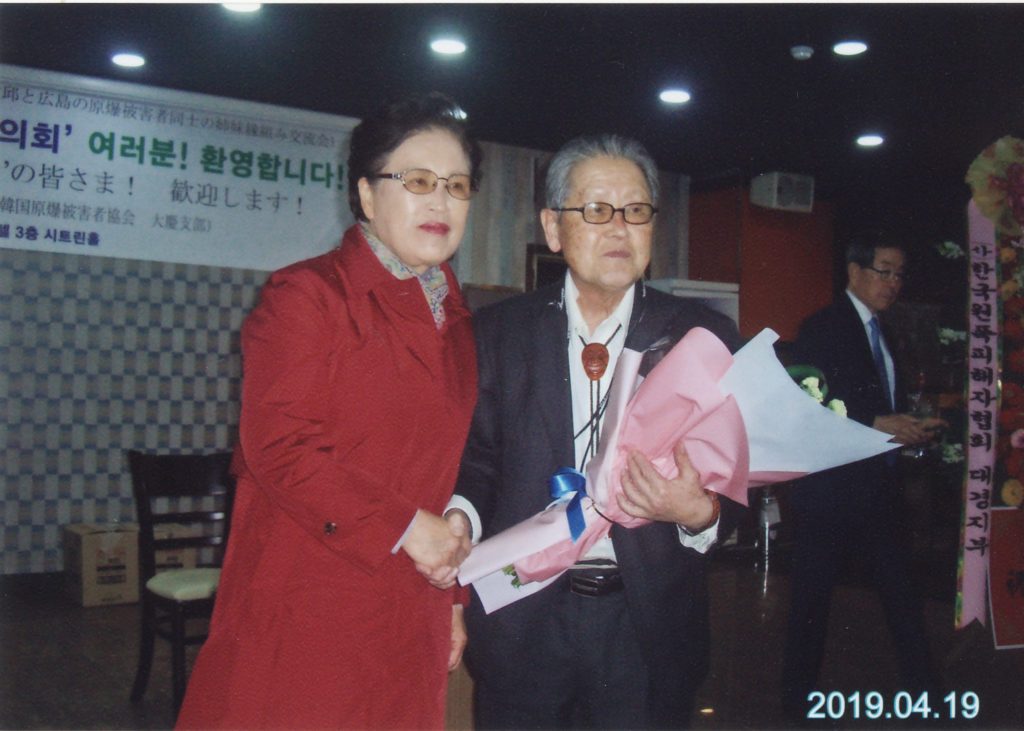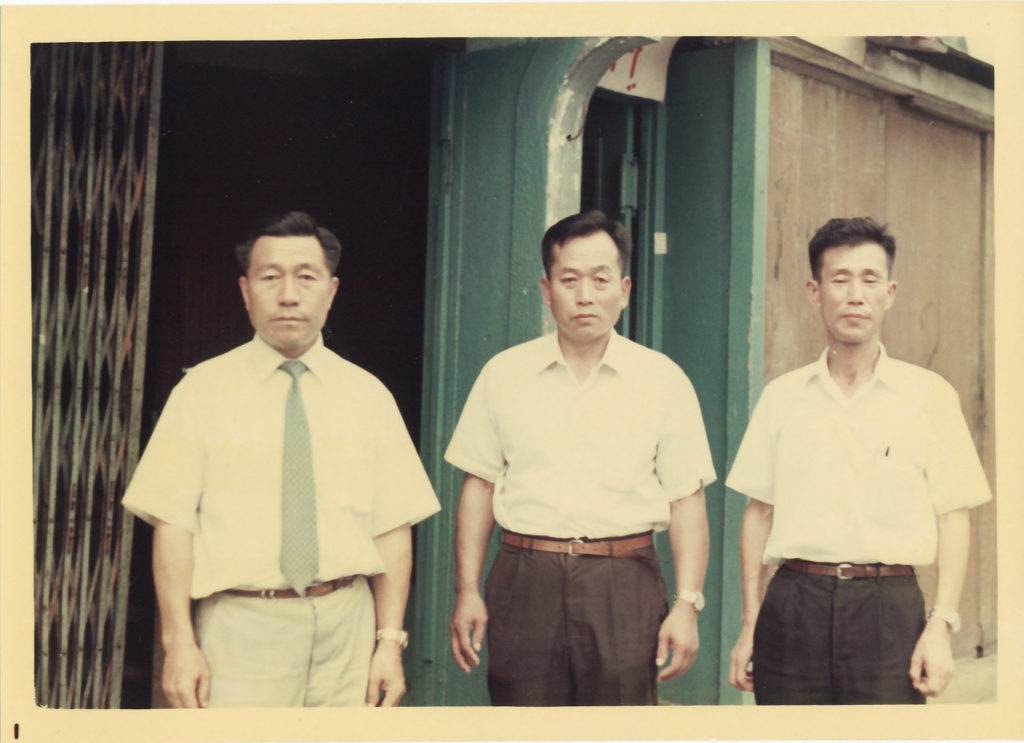Keisaburo Toyonaga
My Life Dedicated to A-bomb Survivors Overseas
8. “A-bomb Survivors Are A-bomb Survivors Wherever They Are!”
I also made a particular effort to support the court cases of hibakusha living abroad. Under the Atomic Bomb Survivors Health Care Act of 1957, hibakusha living in Japan were issued the Hibakusha Health Certificate and were eligible to receive free medical examinations and medical benefits for the treatment of certified diseases, if they met certain conditions set by the government. (Note: There were dozens of further amendments to the law before the current system was adopted.) However, hibakusha who had returned to their home countries or resided in other countries after the war were not eligible for these benefits.
In 1972, a Korean, Son Jindu, said, “There were no appropriate treatment facilities in Korea, and I was smuggled into Japan because I was seized with fear of A-bomb diseases. The Japanese government is the one who did this to my body, so they should be responsible for treating me!” He emotionally appealed to the governor of Fukuoka Prefecture, demanding that he be granted the Hibakusha Health Certificate and won the case in both the first and second trials. In 1978, the Supreme Court ruled that the Japanese government must consider the Korean hibakusha in terms of government compensation, rejected the appeal by Fukuoka Prefecture, and the ruling became final. After this, overseas A-bomb survivors who came to Japan and received the Hibakusha Health Certificate were able to receive medical examinations, treatment for illnesses and other various benefits.
However, in 1974, the Ministry of Health and Welfare issued Notice #402 of the Director-General of the Public Health Bureau, stating that the law does not apply to hibakusha who have moved their place of residence outside of Japan. This meant that overseas hibakusha could not receive support once they returned to their home countries. Overseas hibakusha could receive the Hibakusha Health Certificate if they came to Japan, but once they left Japan, their Certificates expired, they could not receive medical treatment and their allowances were cut off.
Kwak Kwi-Hoon was a Korean A-bomb survivor who had been drafted into the army as a Japanese soldier in 1944 and brought to Hiroshima. He was exposed to the atomic bomb and was left with keloids on his chest, arms, and lower abdomen. He was hospitalized and got treatment from May to July in 1998. However, because of Notice #402, his support was terminated upon his return to Korea. He disagreed with this, and said, “Hibakusha are hibakusha wherever they are! Notice #402 is illegal, and we should be able to receive free medical treatment and benefits even after returning to Korea.” In October that year, he filed a lawsuit against the Japanese government and Osaka Prefecture, demanding “cancellation of the termination of allowance payments.” He also won this case in both the first and second trials, and the government declined to appeal, with the decision becoming final in 2002. Starting with this trial, A-bomb survivors in South Korea, the U.S. and Brazil also filed suits, and in 2007, the Supreme Court finally recognized the illegality of Notice #402.
In addition to these trials, there were also trials for conscripts, laborers who were forcibly recruited from the colonial Korean Peninsula under the Conscription Order of 1944 to work at construction sites and factories throughout Japan. They were forced to work long hours of hard labor in poor housing with poor food. 3,300 Koreans were brought to Hiroshima, including 2,800 to the Mitsubishi Heavy Industries Shipyard and Machinery Works, and 10,000 to Nagasaki, many of whom were exposed to the atomic bombs. In 1995, six former conscripts in Hiroshima, later joined by about 40 others, filed a lawsuit against the government and the Mitsubishi company, seeking compensation for forced transportation for labor, neglect after the atomic bombing, unpaid wages and other issues.
As for the compensation for the forced transportation and unpaid wages, plaintiffs lost the first and the second trials on the grounds of the Japan and Korea Claims Agreement of 1965, and the Supreme Court rejected their appeal. As for the case regarding neglect after the atomic bombing, the Supreme Court recognized the damage caused by the noncompliance with the Three Atomic Bomb Laws. Only this case was won, resulting in the payment of \1,000,000 per person and \200,000 in legal fees. After this, negotiations have continued with the Ministry of Health, Labor and Welfare, and to date, about 4,000 A-bomb survivors overseas have been paid \1,000,000 each plus \100,000 for legal fees. These negotiations continue to this day.
For 40 years, I have been supporting the lawsuits filed by overseas A-bomb survivors in various parts of Japan. I have traveled all around Japan to find the two witnesses needed to obtain the Hibakusha Health Certificate, have assisted in preparing and submitting the necessary documents to cities and prefectures and to have them come to Japan, and have negotiated with the Ministry of Health, Labor and Welfare for their compensation. Up to now, a total of 43 lawsuits have been filed related to overseas A-bomb survivors, and I have been involved in about 80% of those cases. Most of these cases were won.
In 2008, 63 years since the atomic bombs were dropped, the House of Councilors finally passed a bill to amend the Law Concerning Relief for Atomic Bomb Survivors to allow overseas hibakusha to apply for their Hibakusha Health Certificates at Japanese embassies in their countries. According to a survey by the Ministry of Health, Labor and Welfare in 2023, 2,524 A-bomb survivors abroad who hold the Hibakusha Health Certificate are covered by the Hibakusha Relief Law in more than 30 countries, including South Korea, Taiwan, Canada, the United States, Australia, and Brazil. However, according to a survey by the organizations that have supported A-bomb survivors, there are two Certificate holders in North Korea, but because that country has no diplomatic relations with Japan, the Hibakusha Relief Law has not been applied to them.



